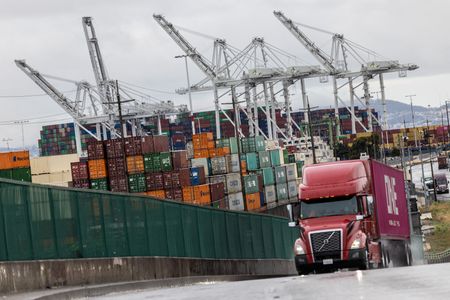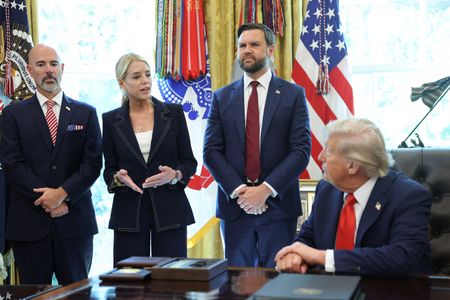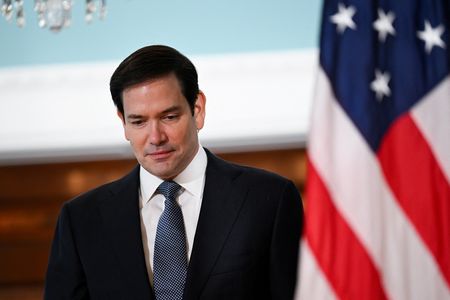By David Lawder, Promit Mukherjee and Julia Payne
WASHINGTON/BANFF, Alberta (Reuters) -Finance leaders from the Group of Seven industrialized democracies will strive for unity on non-tariff issues when they meet in Canada this week, but may have trouble reaching consensus with a Trump administration intent on pushing allies to serve U.S. interests.
The other six G7 members – Japan, Britain, Germany, France, Italy and host Canada – want to keep the powerful Western policy alliance from fracturing over U.S. President Donald Trump’s tariffs and reversals on climate change, global tax cooperation and Ukraine, G7 officials and economic diplomacy experts said.
That may require less-specific communique language and avoidance of some topics. A source briefed on U.S. positions in the talks said that any consensus needed to align with Trump administration priorities.
“We’re not inclined to do a communique just for the sake of doing a communique,” the source told reporters on condition of anonymity.
U.S. Treasury Secretary Scott Bessent will join fellow G7 finance ministers and central bank governors for the Tuesday-to-Thursday meeting in the Canadian Rocky Mountain resort town of Banff, Alberta. That puts disagreements over steep new tariffs imposed by Trump at the center of the discussions, but the U.S. source said no bilateral trade deals would be announced at the G7 meeting.
Japan, Germany, France and Italy all face a potential doubling of reciprocal U.S. duties to 20% or more in early July. Britain negotiated a limited trade deal that leaves it saddled with 10% U.S. tariffs on most goods, and host Canada is still struggling with Trump’s separate 25% duty on many exports.
“No one expects this to be a big moment where the U.S. declares that for G7 and other partners there will be a special regime that’s more favorable,” said Charles Lichfield, deputy director of the Atlantic Council’s GeoEconomics Center in Washington.
Ministers from the other six countries will likely try to tactfully remind Bessent that they are the closest U.S. allies and that it is difficult for them to meet Washington’s demands that they exert economic pressure on China while facing U.S. coercion themselves, Lichfield said.
CHINA PUSHBACK FORUM
A Treasury spokesperson said Bessent will push the countries to address imbalances and non-market practices, including in their own economies, and counteract China’s state-driven economic model.
“The G7 must work together to protect our workers and firms from China’s unfair practices,” the spokesperson added.
Bessent, a former hedge fund manager, has consistently criticized China’s policies that have fueled excess production capacity and unleashed a flood of subsidized goods into market economies.
Bessent is widely seen as a moderating influence on Trump’s trade agenda, so G7 ministers will “encourage him to push for more moderate administration policies on trade,” said Mark Sobel, a former U.S. Treasury and International Monetary Fund official who is U.S. chairman of OMFIF, an independent financial policy think tank.
TRICKY LANGUAGE
Despite disagreements over tariffs, G7 officials, especially host Canada, appear determined to agree on a joint statement from the finance meeting, which will set the stage for a G7 leaders’ summit in June in the nearby mountain resort area of Kananaskis.
G7 government sources familiar with the finance talks said a draft communique has been prepared already and that Canada was pushing to achieve a consensus to show that G7 countries were standing together on a range of issues.
These are expected to include a broad statement of support for Ukraine in its struggle against Russia’s full-scale invasion, with Ukrainian Finance Minister Serhii Marchenko in attendance and the EU readying a new package of sanctions to increase pressure on Moscow.
Any statement on Ukraine will be far less specific than the G7’s last joint finance statement in October 2024, which announced terms for $50 billion in loans to Ukraine backed by earnings from frozen Russia’s sovereign assets.
Trump announced after a call with Russian President Vladimir Putin on Monday that Russia-Ukraine ceasefire talks would begin immediately, a development that could delay new sanctions.
The U.S. source on the G7 meeting said Bessent was leaving all sanctions options open to increase pressure on Russia to bring an end to the war, but any action would depend on “the broader peace process.”
Another area for common ground is likely to be on support for the International Monetary Fund and World Bank after Bessent reaffirmed U.S. backing for the institutions in April.
Other issues on which agreements can be reached include cooperation to fight money laundering and other financial crimes, and Bessent’s call for stronger reliance on the private sector to drive growth, G7 sources said.
However, given Trump’s opposition to the previous U.S. green energy agenda, language on climate change is expected to be a source of discord.
How the G7 will describe the economic uncertainty and stalled business investment unleashed by Trump’s tariffs without explicitly blaming his policies is another thorny issue in the negotiations.
“My crystal ball is so murky now, I can’t really see the future very well,” said Suzanne Clark, CEO of the U.S. Chamber of Commerce at a conference in Ottawa of business leaders from the G7 countries.
(Reporting by Makiko Yamazaki, Julia Payne, David Lawder and Promit Mukherjee; Editing by Kate Mayberry, Andrea Ricci and Richard Chang)











